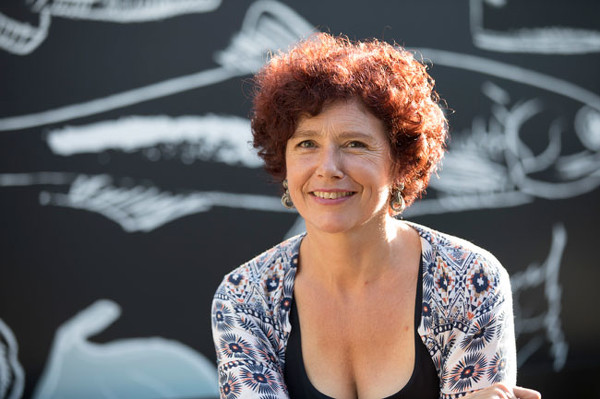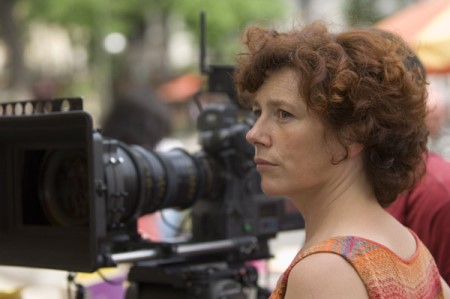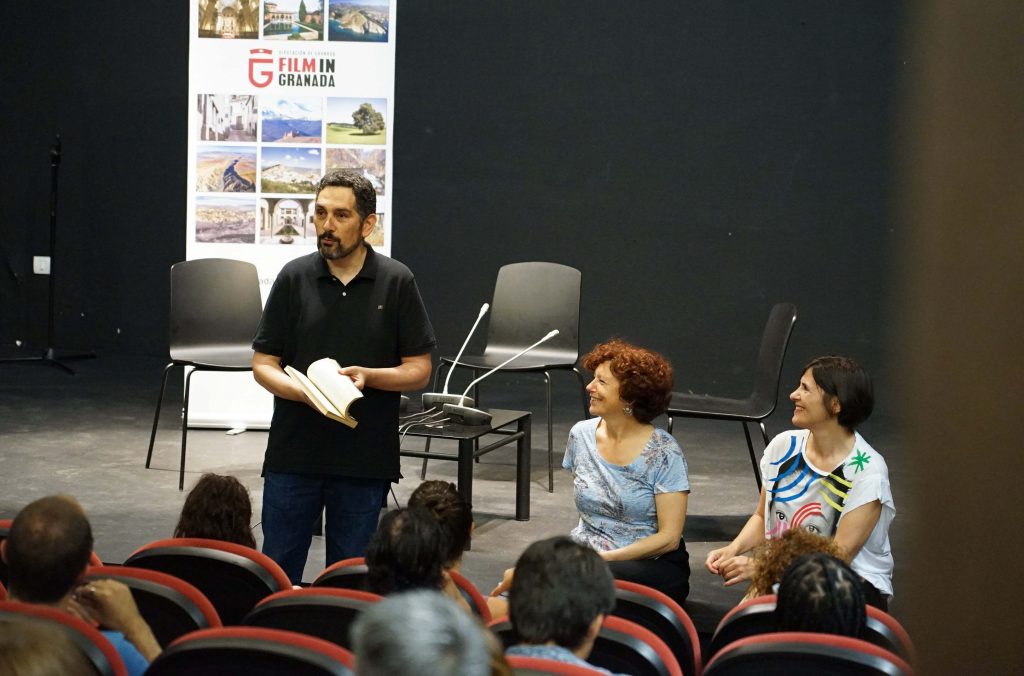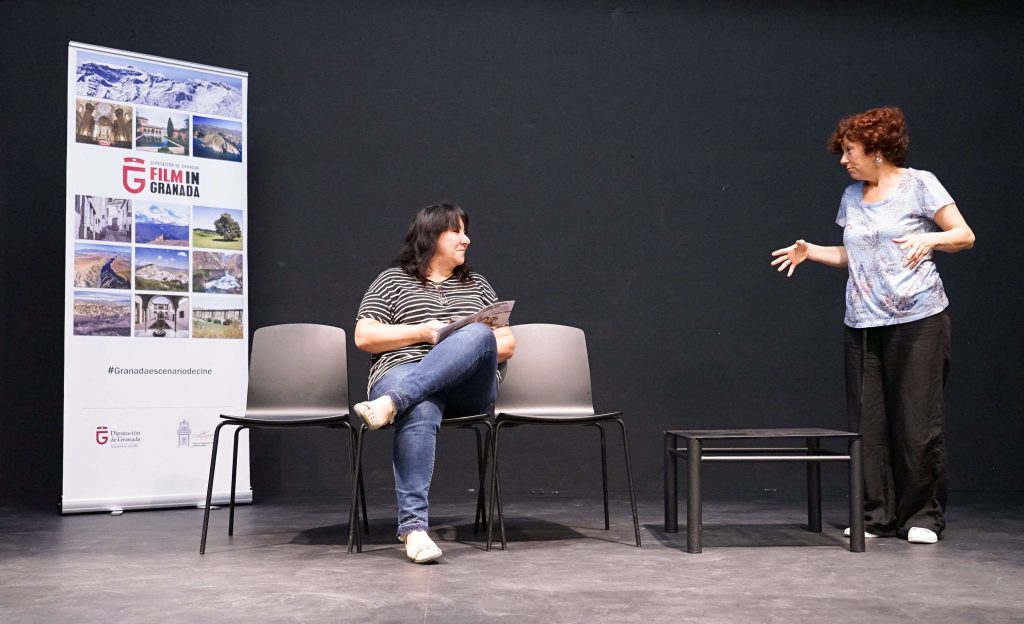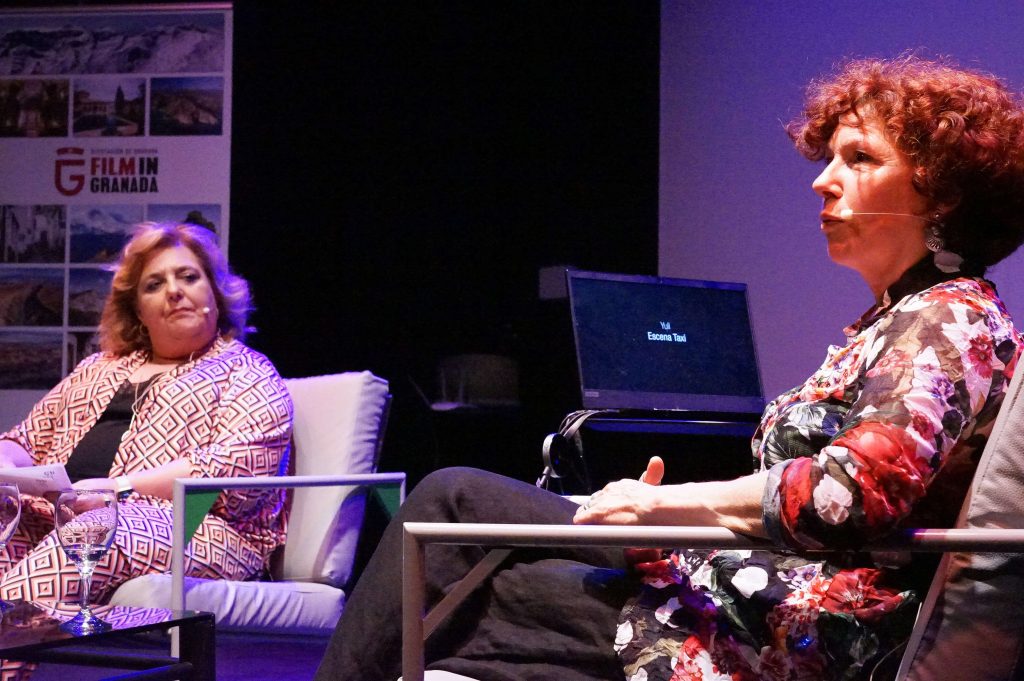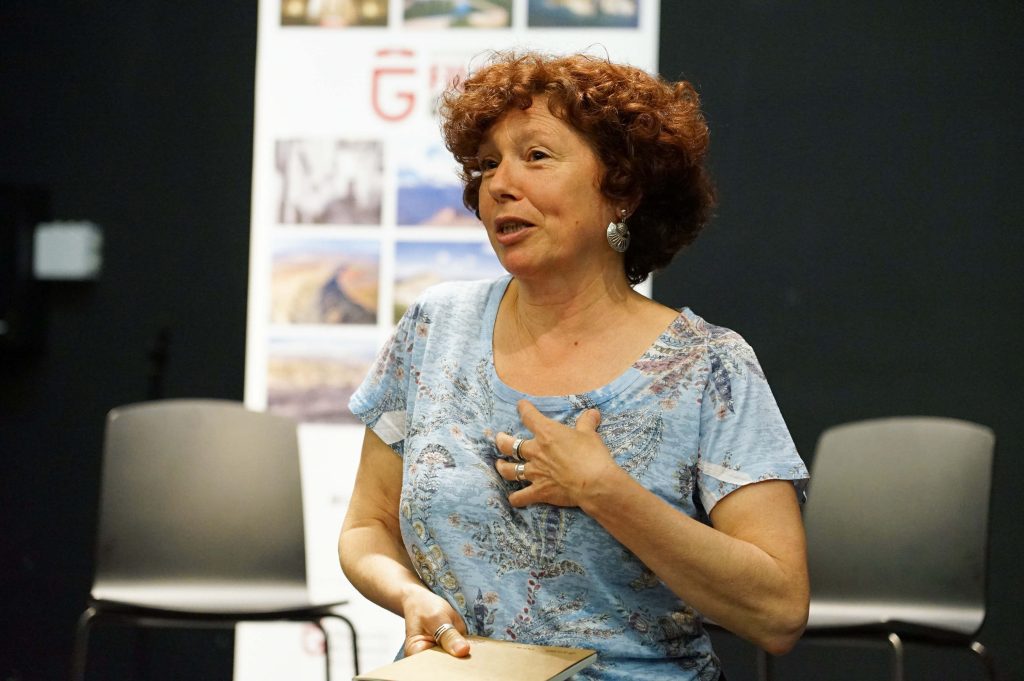Text and photographs: Julio Grosso Mesa (Film in Granada)
Icíar Bollaín (Madrid, 1967) is such a famous and well-known filmmaker that she needs no introduction. She has a solid career as an actress, screenwriter, producer and director: she has been in the Spanish film industry for 39 years, has participated in more than 50 films, has directed 11 feature films and has discovered great actors such as Luis Tosar, Candela Peña and Anna Castillo.
She has also been vice-president of “Academia de las Artes y la Ciencias Cinematográficas de España”, founder of CIMA (Asociación de Mujeres Cineastas y de Medios Audiovisuales), and winner of two Goya awards, among many other prizes.
Beyond these merits, Icíar Bollaín is, above all, a friendly and a close person, familiar, who is a good listener and who has created a cinema with her own brand. As Manuel Vicent well said, “you will always find Icíar behind the camera pointing towards just causes, touched with the right delicacy, that is also her, an awake girl, who smiles with her eyes, who always emits a fresh, intelligent and amusing air, with a touch of distinction”.
Icíar Bollaín has spent a few days in Granada in the month of May. She hadn’t been back here for several decades, when as a teenager she used to come to visit her Andalusian family. On this occasion, she offered a workshop and a master class at the first edition of Filming Lab, a meeting organised by the University of Granada (UGR) and Film in Granada.
During her brief visit, she had time to teach, eat with her cousins and have dinner with old friends, as well as walk around the city and wake up with a view of the Alhambra. She says she is looking forward to returning. Her students have been delighted, hoping for more.
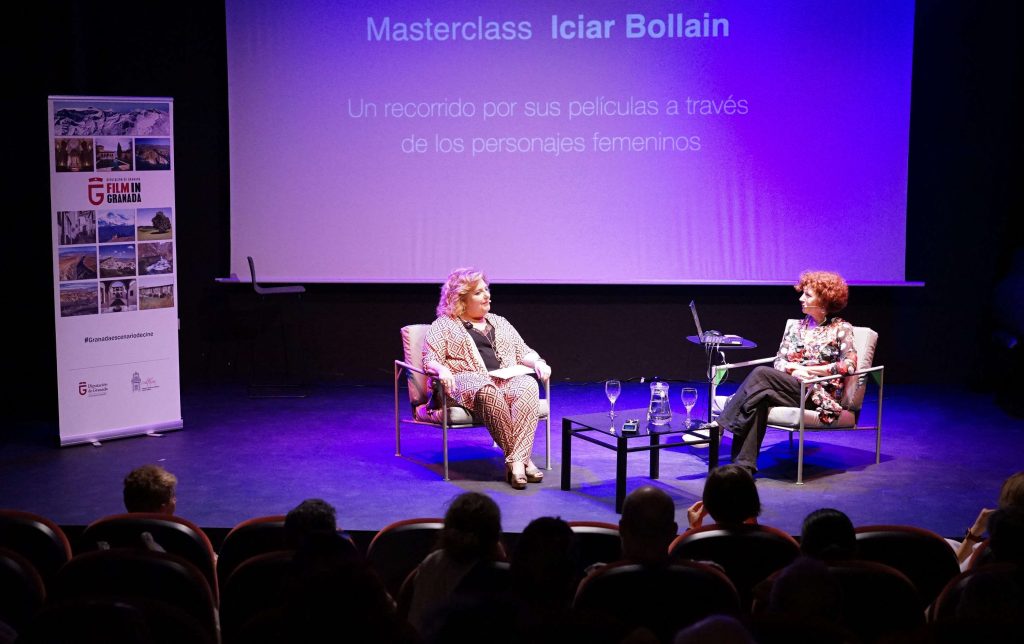
Where do their stories come from? What is the origin?
They often come from a piece of news I read, or from several that deal with a subject that catches my attention, that I don’t understand, that I want to know more about, and then I see the possibility of bring it closer to me through a film. This is the case of “Flores de otro mundo”, “Te doy mis ojos”, “Mataharis” or “La boda de rosa”. Other stories come to me, like the three ones written by Paul (Laverty) or the story of “Maixabel”. But they are always stories connected to what is happening or something that has happened, stories that are close to reality, that concern characters, who are the ones who move the stories.
The main characters in your films are often women who have no voice in society: immigrants, victims of gender violence, widows of terrorism, single women, etc. Has it become a priority?
Honestly, I have not been very conscious of it. I have been getting closer to these women, real or fictional, out of curiosity, interest and, above all, intuition. Maybe it’s because I’ve missed women like that on the screen, I’ve missed their stories and that has led me to tell them.
Your films rarely have a spectacular cinematography and beautiful images in favour of dialogue and characters. Why?
It depends on which stories, I think that too “pretty” photography can be distracting. It can even take us away from what is being told. Obviously I think cinematography is very important, but I believe it has to be at the service of what is being told, otherwise it turns into something else. But I take great care of it, even if you don’t notice it, sometimes it’s so premeditated, both the staging, each shot, the light, the tone, colours that predominate in the film, everything. Next to the director of photography we search for the photo to be as expressive as possible in order to tell what is happening and to make the spectator feel it. And the same goes for the sound, I try to keep it in mind when I’ m telling the story.
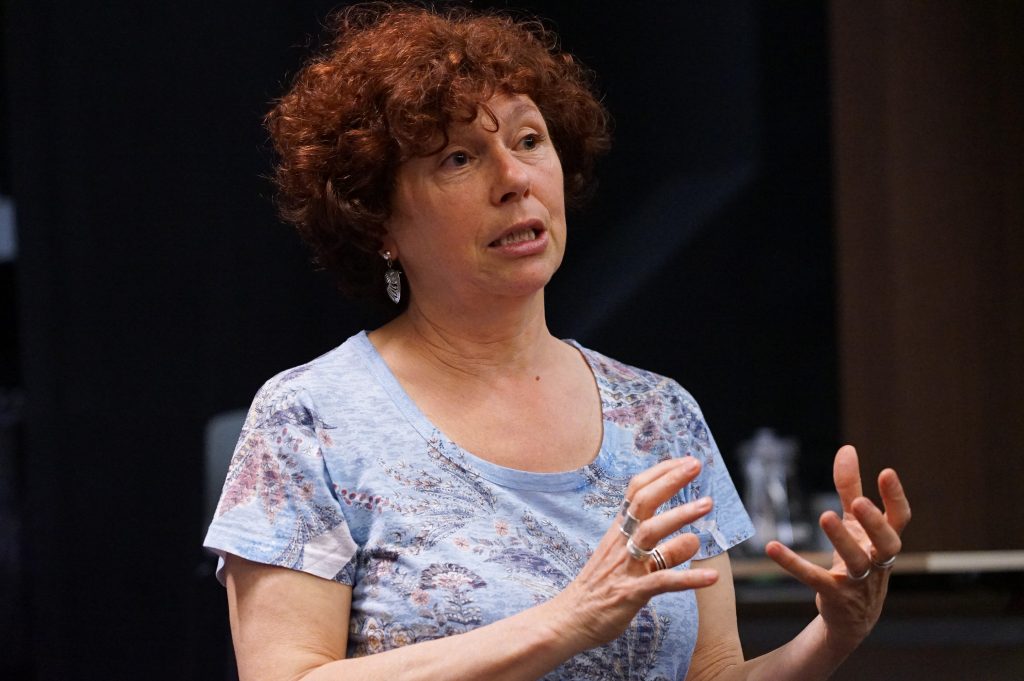
In 1994, working on “Tierra y libertad”, you met Ken Loach and Paul Laverty. Was it a turning point in your work and in your life?
Well, in my life of course, Paul has been my partner almost since then, we have 3 children together and we have also collaborated on 3 films. On the professional side, I don’t think it was a turning point, I already had a solid career as an actress and I had already written the script for “Hola, ¿estás sola?” and the production was in progress, we shot it just a few months after “Tierra y Libertad”. I had also already made several short films and had founded a production company several years ago with three other members. In other words, my professional life was already on its way. Ken was more than anything else a very inspiring person, both personally and professionally. He is a man who has always worked in the same way, he is a very coherent person, and very unique.
Shortly afterwards, you accompanied him to Scotland and Nicaragua on the filming of “La canción de Carla” to write a book. How has his filmmaking influenced you?
Ken is an inspiration in his way of making films and also in his way of working with actors, often with very limited or no experience at all. His films, his images, are of unbeatable truth. And he is also a reference for the topics he deals with and how he does it, which in recent years have always been suggested and of course written by Paul. He is, as I say, someone very inspiring.
Loach claimed in his book (1996) that “cinema had become a place where one goes to escape and the concept of a cinema as a place for the exchange of ideas has been lost”. What is his opinion 25 years later?
Hahaha well… when people go there today, even if it’s just to avoid it, we can all be happy with that… consider yourself lucky
But yes, I agree, there is a period, the 60s, the 70s and even the 80s when cinema is part of a discussion, or is used as part of a discussion. Some films make an impact on society and stir it up, as Ken has often done. Now, I think it is more difficult to have that impact, probably because of the diversification of the way we see cinema, which is often no longer even a common experience, but one that we each have at home. And also, the discussions, when they are generated, last shorter, they are “consumed” quickly, because something new comes along to occupy the discussion.
But, with all that, I see that there are films that remain, that continue in the life of society, and that generate reflection. On Twitter, in other media, they continue to create opinion and reflection. This is my impression of what has happened with “Maixabel”, for example, which has generated a lot of discussion and continues to do so and is going to have a long life in schools and universities, not only in the Basque Country and the rest of Spain, but also abroad, where it is being released, little by little, in different countries.
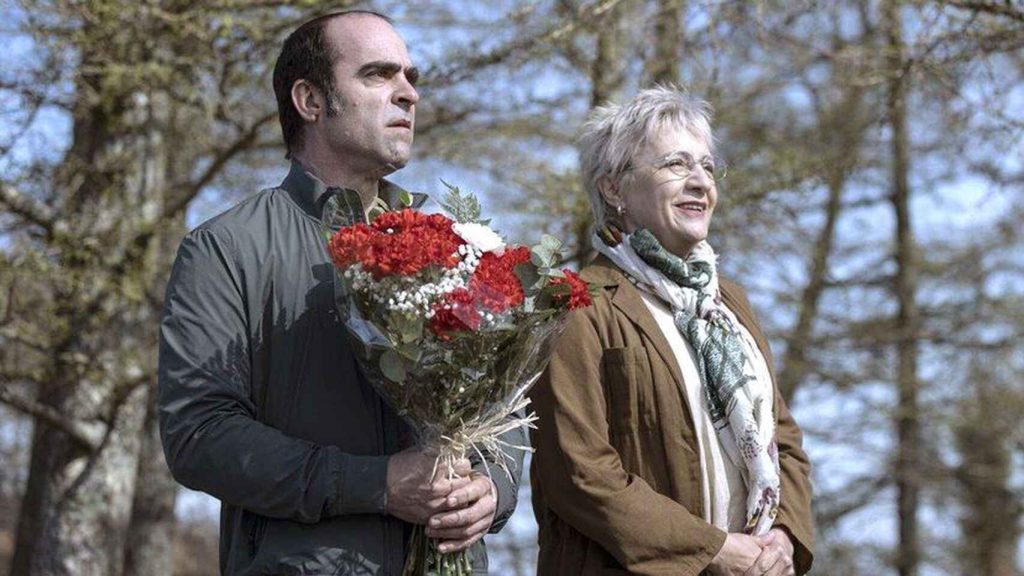
Do you think that the “political and social cinema” has lost importance in Europe?
I think that cinema, in general, has lost importance. And “adult” cinema, either political and social, or simply containing ideas or talking about what is happening to us, and which is usually seen in Europe in the original version circuit, is in decline. It was already in decline before the pandemic, and is now having a hard time recovering spectators. Moreover, cinema audiences are getting older, and young people don’t go to cinemas to see anything other than Marvel or big productions. This is something I’ve been seeing for years, when I go to release films in some European countries. And now it’ s happening a much more.
You had the good sense to offer their first leading roles to Candela Peña, Luis Tosar or Anna Castillo. A coincidence or a good casting?
I’m a big believer in the work of casting. In doing an exhaustive search until you find the best person for the role, whether they are known or not. The three actors you mentioned are fantastic, and, sooner or later, I think they would have found their way.
There is a new generation of Spanish filmmakers who are beginning to be known, such as Carla Simón, Pilar Palomero, Alauda Ruiz de Azúa, etc. What is the most difficult thing about being a woman and a film director?
As in any job that involves responsibility, and in this case, it is the highest responsibility, the most difficult thing is that they trust in your abilities. In your decisions. I have always had people who have had a lot of confidence in me, but that has not prevented me from answer the same question many times… as if you were not sure about it. That you have to insist for what you say make an impression.I think the most difficult thing is to overcome the cultural inertia, sometimes unconscious, that makes it harder to give responsibility to a woman than to a man. In order for us to give it to her, that woman has to be great. On the other hand, we can give responsibility to very mediocre men without dishevel our hair.
You have just taken part in the first edition of Filming Lab in Granada. What feelings do you take with you from this city to Edinburgh?
Well, it has been a real discovery. It’s been a long time since I’ve been here, actually since I was a little girl and came to see the family I have here, and I found it to be a jewel of city. For its size, its dynamism, its people… and of course, for its history and its beauty, which is impressive. I really want to come back, I really do!



